ကျွန်တော်တို့ magic variables ကိုသုံးပြီး automate လုပ်မဲ့ resources တွေရဲ့ facts ( variables ) တွေကို ansible playbook, jinja2 template file မှာ ခေါ်သုံးလို့ရပါတယ်.
magic variables က ansible special variables ထဲမှာပါ ပါတယ်.
အသုံးများတဲ့ magic variables တွေက hostvars, groups, group_names and inventory_hostname တို့ဖြစ်ပါတယ်.
hostvars
ကျွန်တော်တို့ hostvars ကိုသုံးပြီး ansible_facts, playbook variables တို့ကိုခေါ်သုံးလို့ရပါတယ်.
hostvars ကိုသုံးပြီး hosts တွေရဲ့ variables ကို ခေါ်သုံးလို့ရပါတယ်. jinja2 template file မှာသုံးတာများပါတယ်.
ကျွန်တော်တို့ hostvars ကို မသုံးခင်မှာ ansible gather_facts ကို အရင် run ထားဖို့လိုပါတယ်.
ကျွန်တော်တို့ hostvars ကို jinja2 template file မှာသုံးကြည့်ရအောင်.
vim hostvars.j2{% for host in groups['all'] %}
{{ hostvars['worker1.example.com']['ansible_facts']['fqdn'] }}
{% endfor %}hostvars က all group ထဲက worker1.example.com ( host ) ရဲ့ ansible_facts ကို ခေါ်သုံးထားတာပါ.
jinja2 template file ကို ansible playbook မှာ template module ကိုသုံးပြီးထည့်သုံးလို့ရပါတယ်.
ansible playbook နမူနာကို ကြည့်ပါ. ansible playbook က gather_facts ကို deafult run ပါတယ်.
vim hostvars.yaml---
- name: use hostvars
hosts: all
tasks:
- name: use hostvars to check other host variables
template:
src: hostvars.j2
dest: /home/ansible/test.txt
newline_sequence: '\r\n'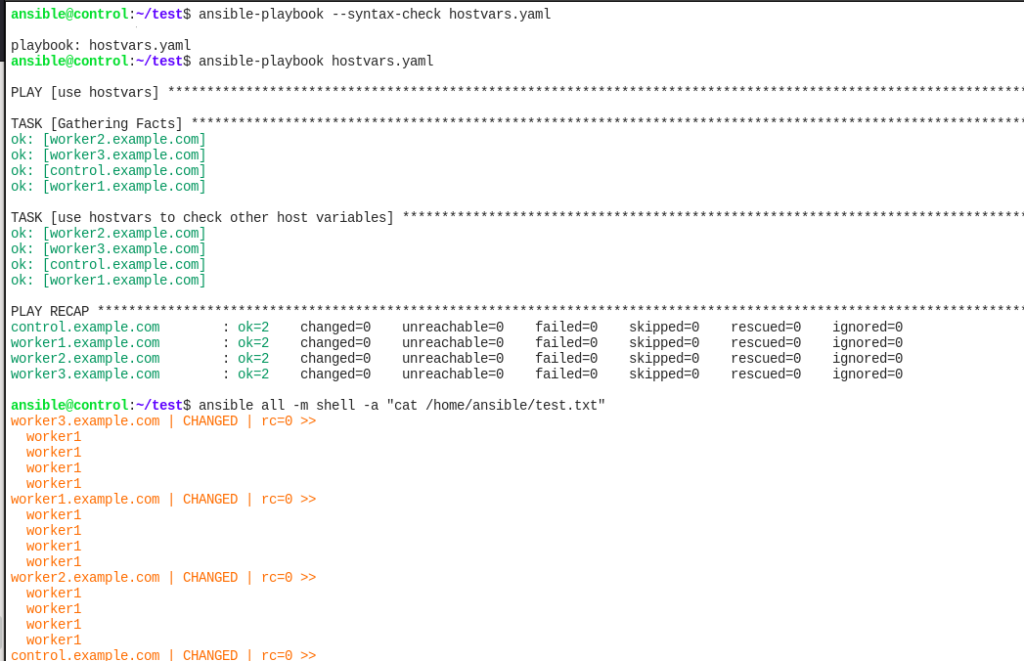
ကျွန်တော်တို့ ansible playbook ရဲ့ hosts မှာ all group ကိုသုံးထားပါတယ်.
တစ်ကယ်လို့ host မှာ worker2.example.com ကိုဘဲ သတ်မှတ်ထားရင် hostvars မှာ error တက်ပါမယ်.
---
- name: use hostvars
hosts: worker2.example.com
tasks:
- name: use hostvars to check other host variables
template:
src: hostvars.j2
dest: /home/ansible/test.txt
newline_sequence: '\r\n'
hostvars ကို မသုံးခင် ကိုယ်သုံးချင်တဲ့ host ရဲ့ variables က cached facts မှာ ရှိနေဖို့ လိုပါတယ်.
play တစ်ခုထည့်ပြီး gather_facts ကို all group မှာအရင် run ပြီးသုံးလဲရပါတယ်.
---
- name: for gather_facts only
hosts: all
- name: use hostvars
hosts: worker2.example.com
tasks:
- name: use hostvars to check other host variables
template:
src: hostvars.j2
dest: /home/ansible/test.txt
newline_sequence: '\r\n'ansible playbook တစ်ခုထဲမှာ ဖြစ်လို့ all group ရဲ့ variables တွေက cache အနေနဲ့သိမ်းပြီးတာပါ.
နောက် play ရဲ့ host မှာ worker2.example.com ကို သုံးရင် variables က cache မှာရှိပြီးတာဖြစ်လို့ hostvars ကိုသုံးလိုရပါ ပြီး.
multiple play ကိုတော့ သုံးရမှာပါ.
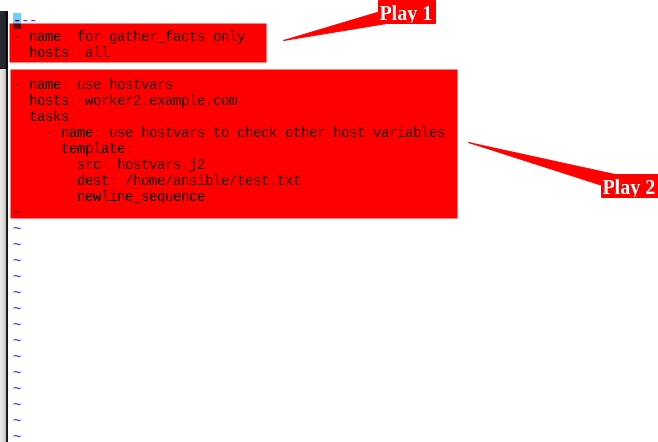
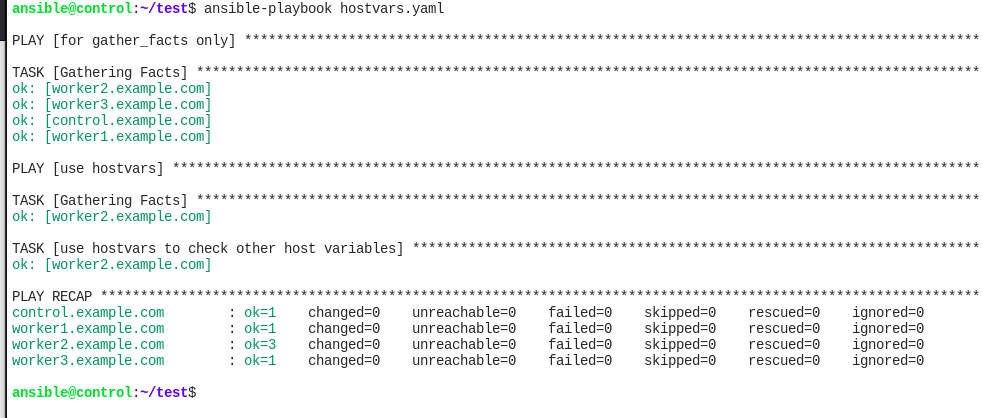
groups
groups ( magic variables ) ကိုသုံးပြီး inventory ထဲမှာရှိတဲ့ groups, hosts list တွေကို Jinja2 Template file မှာသုံးလို့ရပါတယ်.
{% for host in groups['app_servers'] %}
# something that applies to all app servers.
{% endfor %}groups and hostvars ကိုတွဲသုံး လို့ရပါတယ်.
{% for host in groups['app_servers'] %}
{{ hostvars[host]['ansible_facts']['eth0']['ipv4']['address'] }}
{% endfor %}( “app_servers” ) groups ထဲ့က hosts တွေကို for loop ကိုသုံးပြီး hostvars နဲ့ IPv4 address ကို ansible_facts ကခေါ်သုံးတာပါ.
group_names
group_names ( magic variables ) ကို သုံးပြီး host တစ်ခုဟာ list of groups ထဲမှာပါ မပါကို check လုပ်လို့ရပါတယ်.
ကျွန်တော်တို့ group_names ကို jinja2 မှာ သုံးကြည့်ရအောင်.
vim group_names.j2{% if 'dev' in group_names %}
This host is a member of dev group
{% endif %}ကျွန်တော်တို့ playbook run တဲ့ hosts တွေက ( dev ) group ထဲမှာ ပါရင် Jinja2 Template file မှာသတ်မှတ်ထားတာတွေ ကိုအသုံးပြုမှာပါ.
group_names က inventory file ထဲက groups တွေကို check လုပ်ပါတယ်.
Inventory file ကို ကြည့်ပါ.

ansible playbook မှာ jinja2 template file ကို သုံးကြည့်ပါ.
vim group_names.yaml---
- name: use group_names
hosts: all
tasks:
- name: use group_names to check host membership
template:
src: group_names.j2
dest: /home/ansible/group_names.txt
newline_sequence: '\r\n'ကျွန်တော်တို့ hosts နေရာမှာ all ( group ) ကိုသုံးထားပါတယ်.
Jinja2 template file မှာ group_names နဲ့ ” dev ” ( group ) ကိုဘဲ condition check လုပ်ထားလို့ ” dev ” ( group ) မှာပါတဲ့ hosts တွေမှာဘဲ သုံးလို့ရမှာပါ.
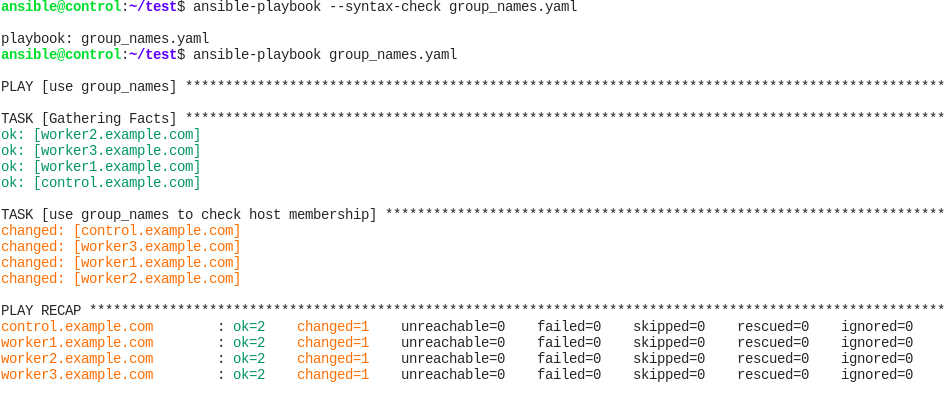
” dev ” ( group ) မှာပါတဲ့ hosts တွေမှာဘဲ jinja2 template file မှာ သတ်မှတ်ထားတာ တွေက effect ဖြစ်တာကိုကြည့်ပါ.

inventory_hostname
ကျွန်တော်တို့ gather_facts ကို disable လုပ်ထားတဲ့အခါမှာ inventory_hostname ကို ansible_hostname အစားသုံးလို့ရပါတယ်.
inventory file ထဲမှာ သတ်မှတ်ထားတဲ့ host names တွေကို inventory_hostname ( magic variables ) ကခေါ်သုံးလို့ရပါတယ်.
inventory_hostname ကို jinja2 မှာသုံးတာကိုကြည့်ပါ.
{% for host in groups['all'] %}
{{ hostvars[host]['inventory_hostname'] }}
{% endfor %}ကျွန်တော်တို့ hostvars အနောက်က host နေရာမှာ ( ‘ ‘ ) မထည့်ထားပါဘူး, ( ‘ ‘ ) ထည့်ပြီး သုံးရင် error တက်ပါတယ်.
host တစ်ခုချင်စီ သုံးရင် ( ‘ ‘ ) ကိုသုံးဖို့လိုပါတယ်.
{{ hostvars['worker1.example.com']['inventory_hostname'] }}Jinja2 Template file ကို ansible playbook မှာသုံးတာကိုကြည့်ပါ.
vim inventory_hostname.yaml---
- name: use inventory hostname
hosts: all
gather_facts: False
tasks:
- name: use inventory_hostname to check other host variables
template:
src: inventory_hostname.j2
dest: /home/ansible/inventory_hostname.txt
newline_sequence: '\r\n'ကျွန်တော်တို့ gather_facts ကို False လုပ်ပြီးပိတ်ထားပါတယ်.

inventory_hostname.txt ကို အခြား hosts တွေမှာ ansible ad-hoc command သုံးပြီး check လုပ်ပါ.
ansible all -m shell -a "cat /home/ansible/inventory_hostname.txt"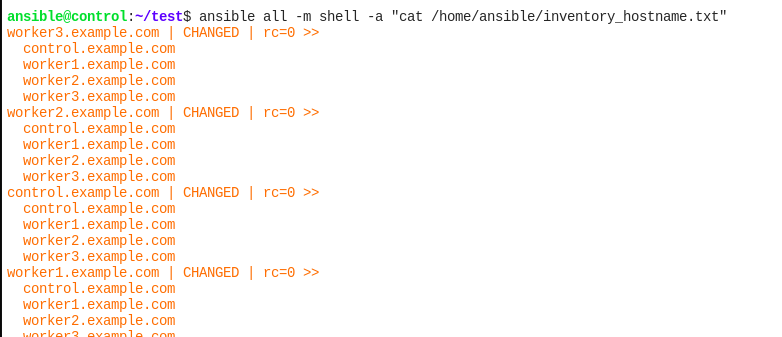
အခြား magic variables တွေကိုကြည့်ပါ.
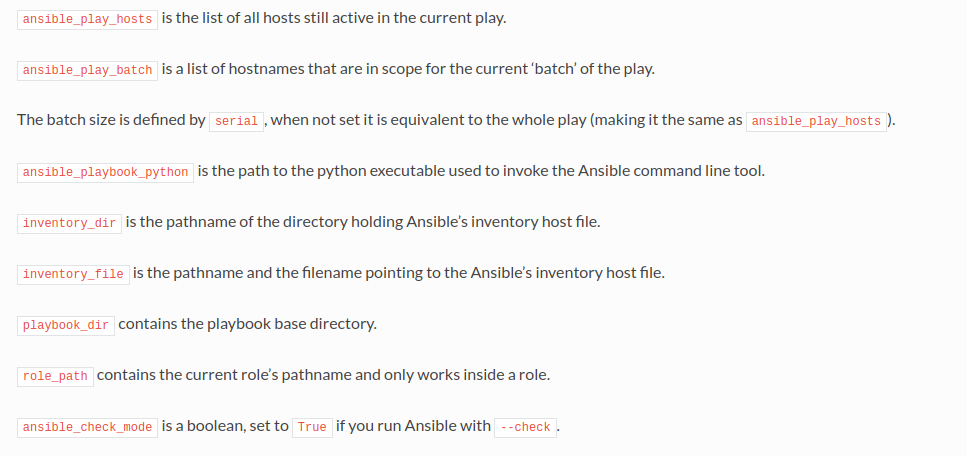
ansible ကိုဆက်လေ့လာ လိုလျှင်.
https://www.ansiblefordevops.com/
https://www.jeffgeerling.com/blog/2020/ansible-101-jeff-geerling-youtube-streaming-series